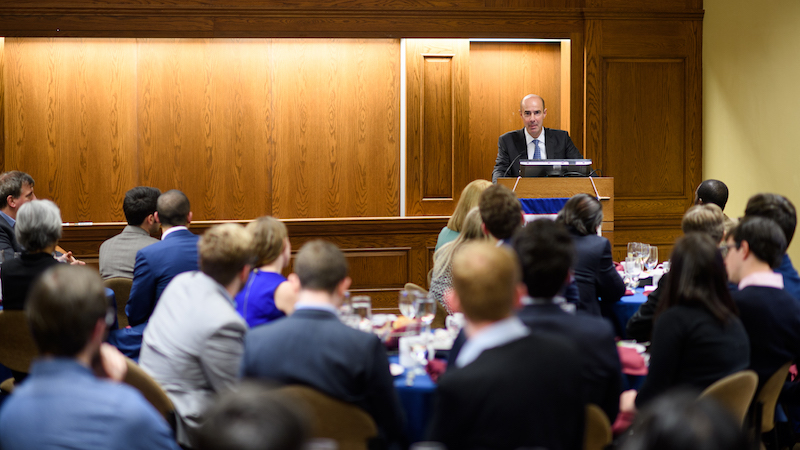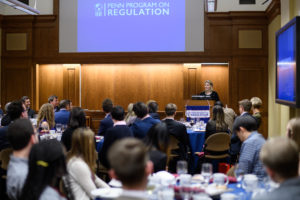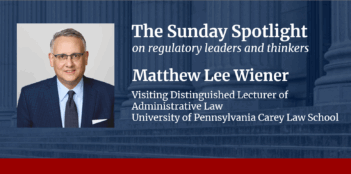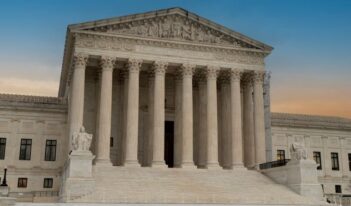
Appearing before agencies affords the public an important opportunity to have a genuine impact on the law.
Thank you for the honor of speaking at this annual dinner, and I would like to commend Professor Cary Coglianese, and all who are involved in running the Penn Program on Regulation, for making the Program and events like this available to students here at the University of Pennsylvania Law School.
The topic that brings us together this evening—administrative law—might seem obscure and dry to some, but its subject is democracy. The questions it asks are some of the most important we consider as citizens: Who makes the law? To whom are they accountable? What role should the public have in all of this?

2016–17 Editor-in-Chief Kim Kirschenbaum introduces Eugene Scalia at the PPR annual dinner.
Consider these legal questions: Is a particular agency action a rule that requires proceeding by notice and comment? Is a final rule the logical outgrowth of the rule that was proposed? Did the agency adopt a rule without giving consideration to a significant comment in the rulemaking record?
Some people might think, “how tedious, how obscure!” But you and I know differently. Each of those questions goes to the role the American people will play in the development of law. The questions can be restated as follows: Will there be advance notice to the public of the law’s requirements, as required for a new regulation? Did the public have a chance to speak and be heard, as required by the notice-and-comment process? And, was the public listened to—and if it is ignored, will the public have the chance to go to court and force the agency to listen and respond to its evidence and point of view?
Or take the questions of Chevron and Seminole Rock deference. (For personal reasons, I prefer to call it Seminole Rock—not Auer—deference.) To most lawyers, these are obscure matters, though many appreciate that Chevron has to do with the authority of regulatory agencies. But those in this room know that questions of deference go to fundamental issues in our constitutional democracy: What ability should the executive branch have to make law? What role do our courts have in pronouncing what the law is? To what extent should we permit Congress to absent itself from some of the most important legislative decisions that are made for our society?
Administrative law is the law that governs the government, and at bottom, its subject is questions like these—some of the great questions about government and democracy.
I have had the opportunity to serve in the federal government three times, twice as a lawyer. But I would like to discuss here the role that outsiders play in our system of administrative law—companies, unions, environmental groups, and others, including lawyers. Because as I have been suggesting, administrative law is in part about participatory government. And especially as the administrative state expands and Congress punts more—and more difficult—policy questions to agencies, it is often by appearing before those agencies that the public has its most valuable opportunity to participate in the development of the law. Appearing before agencies—and occasionally, appearing opposite those agencies in court—gives the public an opportunity to have a genuine impact on the law. And to improve the law.

PPR Director & Penn Law Prof. Cary Coglianese welcomes dinner attendees.
Because that is the other value of notice and comment: Not merely giving the public a voice, but also bettering the rules that govern us. In the words of the D.C. Circuit, notice and comment improve the law by making sure “the agency will have before it the facts and information relevant to a particular . . . problem.” “Public participation in the rulemaking process,” that court has said, “is essential in order to permit administrative agencies to inform themselves.” We value public participation in rulemakings in part because it is an opportunity to bring valuable evidence to the agency’s attention, to explain effects of a proposed rule that the agency may not have appreciated, and simply to bring a perspective that the agency itself otherwise would not have.
In this way, the public’s participation in the administrative process can make the law better—better informed, and better calibrated to the impacts a regulatory action will have.
The converse is also true, by the way. When the public does not participate in a thoughtful way, the rulemaking process can suffer. Government decision-making is weakened when the public’s contribution falls short. We call this garbage in, garbage out.
I have observed this shortcoming in government decision-making in my own law practice. In recent years I have brought court challenges to a number of actions by financial regulatory agencies—the U.S. Securities and Exchange Commission (SEC), U.S. Commodity Futures Trading Commission, and the Financial Stability Oversight Council. I still recall my apprehension—bordering on trepidation—when I got involved in my first SEC rulemaking. By training I am a litigator and, originally, a labor and employment lawyer. By the time I got involved in this rulemaking, I felt I had a pretty good handle on the requirements of the anti-discrimination laws, minimum wage and overtime requirements, and the like. But regulating the financial markets—that’s another thing, I thought: Heavy, sophisticated stuff.
And so I was stunned when I dug into the file at the SEC in this rulemaking and saw the comments that had been submitted by the public, and how the agency dealt with them. The comments generally were brief and conclusory, and merely asserted a view: “We believe you should do the following.” Or, “we believe you should not do the following.” If it was a matter the commenters felt especially strongly about, they would say so—that is, “we strongly believe you should do the following.” The animating principle appeared to be that if a lot of important people spoke firmly, the agency would heed that and act accordingly.
Many people who participate in rulemakings seem to view rulemaking’s closest analogue as an election. In notice and comment, they seem to think, whichever side gets the most votes wins. I view it more like a trial: If it is a contentious rulemaking, you want to get all your evidence and argument before the agency in the hope of persuading it. But if you cannot persuade the agency, you have made the record you need for an effective appeal—that is, for a court challenge to the rule. Because just like at trial, in a rulemaking if you do not put your evidence and argument before the agency, it often is not going to be admissible later in court.
This essay is the first of a three-part series, The Public’s Role in Administrative Law, drawing on Scalia’s keynote address at the 2017 Annual Penn Program on Regulation Lecture.




